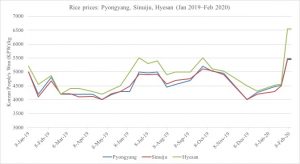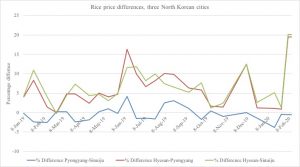By Benjamin Katzeff Silberstein
North Korean authorities seem to have basically ordered the country’s border to China shut entirely in response to the coronavirus outbreak, though it’s still unclear to what extent these orders are being implemented. Reuters:
“They’re keeping the cargo out and they’re keeping the Chinese out; nobody can go in or out,” said one source with firsthand knowledge of the situation at the China-North Korea border.
Kang Mi-jin, a North Korean defector in Seoul who reports for the Daily NK website, also confirmed that the border appears to have been almost entirely shut down since at least Jan. 30.
“The Ministry of People’s Armed Forces ordered all guard posts to bar smuggling as well,” she said. “People, freight, nothing can come in or go out.”
Pyongyang has reportedly asked Beijing not to repatriate North Korean defectors detained in China, according to one South Korean pastor who works with refugees.
According to the source with knowledge of the situation at the border, North Koreans who work in restaurants and elsewhere in China, violating United Nations sanctions, are in “virtual captivity” in their homes under instructions from authorities back in North Korea.
North Korea is typically adept at implementing public health interventions and acted “swiftly and decisively” to try to stop the disease from entering the country, but sanctions restrictions could make it difficult for them to get medical supplies, said Harvard Medical School’s Kee Park, who has worked on health care projects in North Korea.
“Their actions, very costly in terms of revenue from tourists and trade as well as administratively for quarantining people, reflect their concerns regarding their health system’s capacity to handle an outbreak,” Park said.
The efforts – which appear to have been successful in preventing any cases in North Korea so far – mean North Korea has severed or drastically restricted the economic ties it relies on.
“There could be a huge impact not just on the North’s market economy, but also on the entire economy of the country,” Kang said. “North Korea promotes localization, but even for products – candies, crackers, or clothing – manufactured in the country, the raw materials come from China.”
Upcoming North Korean political holidays, which usually include gifts of sweets and crackers for children, may be more less festive than usual if the country’s supplies of sugar, flour, and other ingredients are scarce, she said.
Source and full article: “Burdened by sanctions, North Korea sees coronavirus threaten economic lifelines,” Josh Smith, Reuters, 4/2/2020.
Daily NK reports similar that the government has, quite incredibly, shut the crucial Sinuiju port for shipments to and from China:
Daily NK sources reported that with the port’s shutdown, maritime transportation of goods near the Sino-North Korean border have completely come to a halt.
“All the harbors at Sinuiju Port, which were open until at least Jan. 24, have been completely shut down as of Jan. 25,” a North Pyongan Province source told Daily NK on Friday.
“Authorities are prohibiting the movement of both personnel and goods to stop the coronavirus from entering the country,” he added.
Daily NK sources explained that ships leaving for sea must normally receive a confirmation document and undergo a series of inspections at port customs, but all the customs offices are currently closed and all the boats are docked.
Sinuiju Port, which sits opposite the Chinese city of Dandong in Liaoning Province, is a hub for smuggling as well as official trade with China.
Government ships charged with clamping down on smuggling on the Yalu River have also halted operations, Daily NK sources reported.
“Since all the boats are docked, all the anti-smuggling boats working along the Yalu River have anchored as well,” one source said. “The military unit overseeing the boats have given orders that ‘nobody is to come into contact with Chinese people.’”
Smuggling along the Yalu River also appears to have largely stopped, according to Daily NK sources.
”The current atmosphere is such that if anyone were to say they were going out to smuggle, they would be branded a traitor,” one source said.
With North Korea constantly emphasizing the danger posed by the Wuhan coronavirus through state media along with intensifying its border security, smugglers are on their toes, Daily NK sources said.
Not only is there a fear of infection, but smugglers are also worried that being caught smuggling while the government is so intensely guarding the border might lead to much harsher punishment than usual.
Article source: “N. Korea shuts down Sinuiju Port amid coronavirus fears,” Mun Dong Hui, Daily NK, 4/2/2020.
The state is taking very serious measures. According to another Daily NK report (in Korean), medical staff has been dispatched to all customs houses along the Chinese border, and are checking the vitals of everyone who enters from China. In the Nampo port, North Korea’s commercially most important one, foreign passengers are forbidden from leaving their ships and entering the country.
As NK Pro reports, tourism is essentially completely banned, and border crossings with China and Russia completely shut aside from outbound movements of people (with some exceptions, as reported here by Daily NK). Goods may still cross by land between the countries. People who have been to China are quarantined for one month.
Predictably, goods prices have soared as a result of the border closings, particularly on manufactured and imported goods from China. Prices for goods like flour have gone up by 47 percent since January. This is itself very interesting, since we’ve seen such small or non-existent market price changes following sanctions thus far. The most likely reason is that sanctions actually do not greatly impact most goods that matter to people’s everyday lives, and the North Korean government won’t exactly stop goods from crossing the border. Here, however, the government itself is enforcing a blanket ban on crossings. It’s serious, and reportedly even for smugglers.


